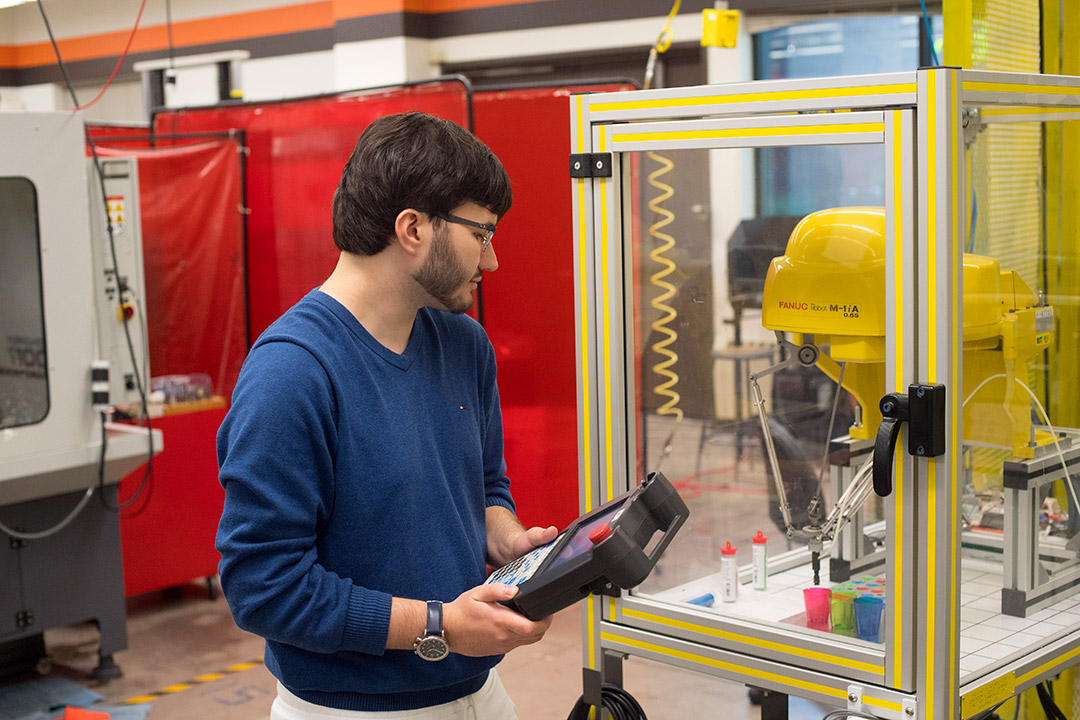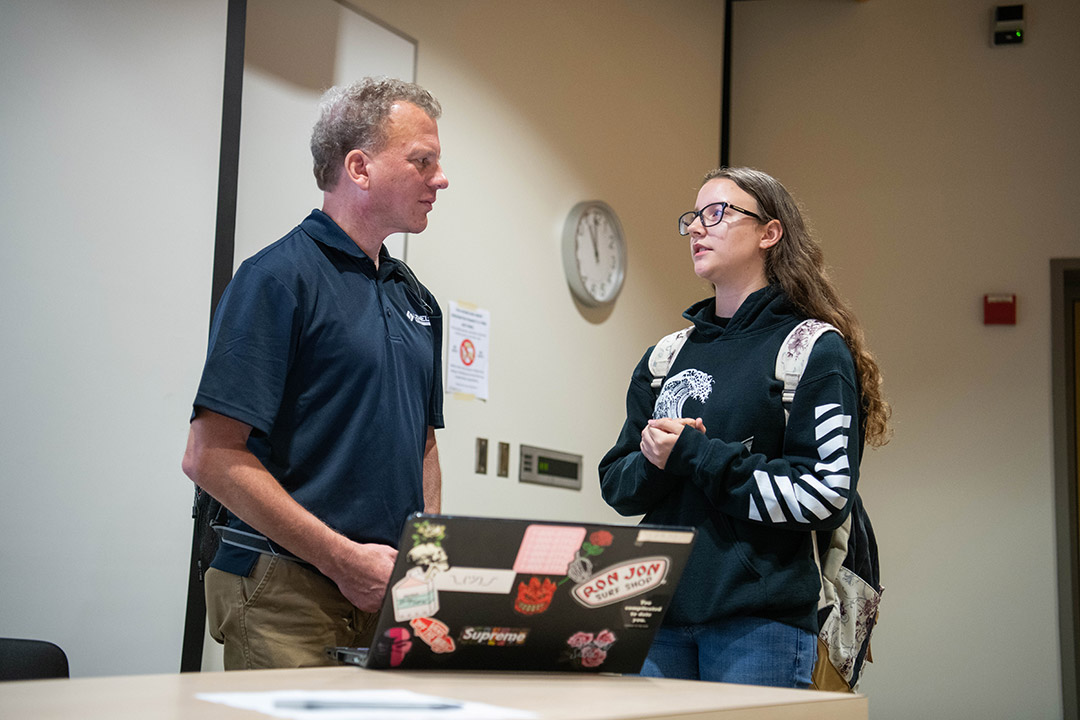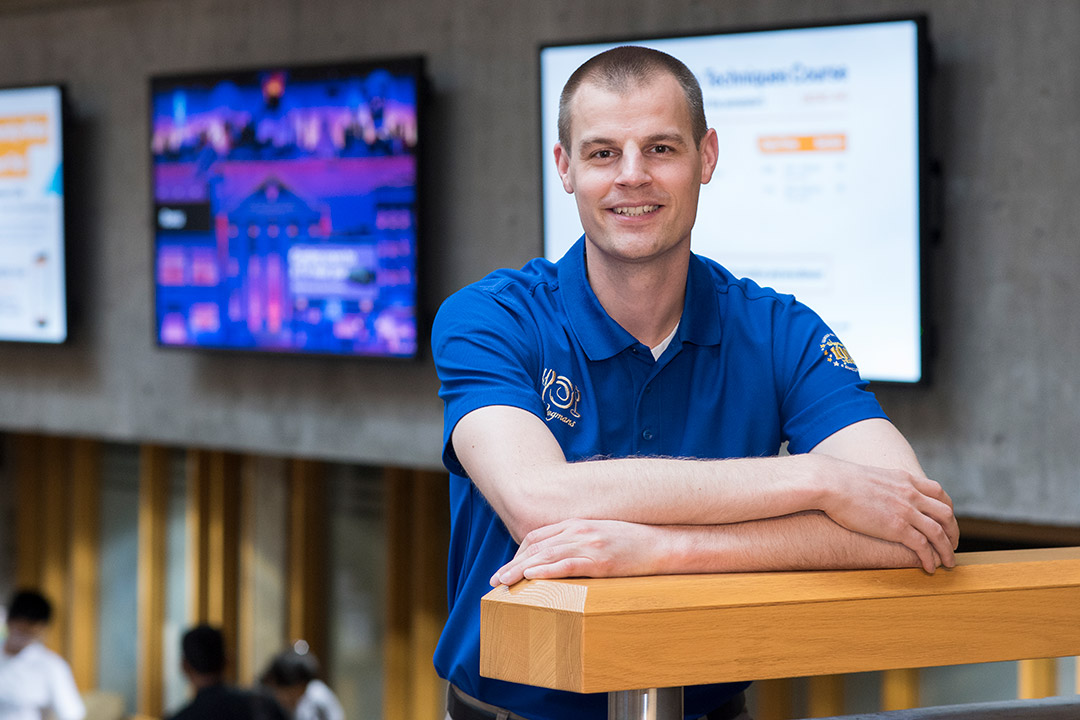Learning from Industry: Employers keep RIT’s curriculum forward-looking
A. Sue Weisler
Oluwamayowa (Mayo) Olojo, a second-year computer science student, right, was prepared to talk with employers at the RIT Career Fair after taking a new required class. The Computer Science Industry Advisory Board helped shape the class.
In a new lab on RIT’s campus, engineering students can experiment with the latest internet-connected sensors that make today’s factories “smart.”
One building over, computer science professors are helping their students stand out to future employers by adding more project-based learning to classes.
And graduate students in a new global supply chain management degree program can now infuse analytics and technology into their business studies.
These curricular updates are the result of recommendations from just a few of the university’s industry advisory boards and councils. For the last several decades, volunteer groups have played a pivotal role in keeping RIT’s curriculum relevant and current with the latest industry trends.
“Industry changes at a rapid rate, and without the help of our industry advisory groups, it would be difficult for faculty and programs to stay up-to-date on everything,” said S. Manian Ramkumar, dean of the College of Engineering Technology. “No matter what you’re studying at RIT, it needs to be relevant to today’s industry, so our graduates can hit the ground running immediately.”
The groups of 10 to 30 leaders from a wide variety of companies come together a few times a year to offer their insights for RIT faculty and staff in nearly every college.
For some advisory board members, the group discussion is a chance to shape the future of their industry. For others, including Paul Monette ’94 (computer science), being part of an industry advisory board is an opportunity to stay connected with his alma mater.
“But, it’s not always altruistic,” said Monette, who is director of software engineering at CloudCheckr, a cloud services and infrastructure management company in Rochester. “I also get a better understanding of what today’s graduates want from a career, which gives me key insights for recruiting top talent for co-ops and jobs.”
What’s new in industry
Robert Garrick sees his department’s industry advisory group as the voice of the customer.
“We’re teaching the engineers that they’re going to hire in five years,” said Garrick, acting chair of the Department of Manufacturing and Mechanical Engineering Technology. “So we need to find out what skills, certifications, and training these graduates might need in the year 2025.”
 A. Sue Weisler Anthony Novakovic, a fourth-year electrical mechanical engineering technology student, uses a FANUC LR Mate 200iC robot to complete his lab assignment. Employers want students who understand how to use internet-connected robots.
A. Sue Weisler Anthony Novakovic, a fourth-year electrical mechanical engineering technology student, uses a FANUC LR Mate 200iC robot to complete his lab assignment. Employers want students who understand how to use internet-connected robots. For many manufacturing experts in the MMET industry group, the future is in Industry 4.0. As factories become equipped with wireless sensors and monitors, engineers are able to gather new data—analyze it using machine learning—and use that information to continuously improve quality and processes.
“Smart manufacturing is where the industry is going, so that’s where we’re going too,” said Garrick.
With guidance from the industry board, RIT recently established a new Industrial Internet of Things (IoT) Lab. Featuring a networked and cloud-connected programmable logic controller (PLC) based system, students have access to high-performance computers, advanced sensors, actuators that gather data, scalable storage, and the ability to manage the technology remotely.
Since fall, students have been using the lab for courses on automation and controls. The space will also be used by faculty and student researchers who are working to develop new hardware, software, control algorithms, and machine learning techniques.
Adding new skillsets
In a new seven-week Co-op Seminar Course for computer science students, industry feedback is being used to prepare students for co-operative education employment.
Students in the required class develop their résumés and job interview strategies. They also cover data privacy ethics, what to expect from the onboarding process, and how to dress for their first day on the job.
 Gabrielle Plucknette-DeVito Paul Wisotzke ’88 (business management), a test and validation manager at UTC Carrier, took part in an industry panel to share his work and hiring experiences with students in the Co-op Seminar prep class, including Kailey Coates, a second-year computer science student.
Gabrielle Plucknette-DeVito Paul Wisotzke ’88 (business management), a test and validation manager at UTC Carrier, took part in an industry panel to share his work and hiring experiences with students in the Co-op Seminar prep class, including Kailey Coates, a second-year computer science student.“We’ve overwhelmingly heard from our industry advisory board that employers want to hire students who can seamlessly blend into the professional workplace and get right to work,” said Reynold Bailey, a computer science professor who co-teaches the Co-op Seminar with Mindy Blake, a career services coordinator. “Members of the board have even volunteered to serve on an employer panel during the seminar so they can share first-hand what computer science industry professionals are looking for.”
“It’s these little things that give our students a leg up in the workplace,” Bailey added.
The industry advisory board also assists the department with maintaining its ABET accreditation, making sure that technical aspects of the program are up to professional standards.
Industry feedback has changed the curriculum in other computer science classes as well.
As a UX Engineer and recruiter at Google, Erik Haddad ’06 (computer science), ’07 (MBA) enjoys talking with prospective employees about the projects they create in and out of the classroom. He also wants to log onto GitHub to actually see them.
“I can read through a transcript of how job candidates worked with past team members on a project and faced each problem,” said Haddad, who is part of the computer science advisory board. “Most of the candidates who get job offers are the ones who have open source and public projects that we can actually see.”
As a result, Bailey and other professors have been adding more project-based learning to their courses.
“In my classes, I’ve always focused on learning by doing, but now I also emphasize to students the importance of being able to share their work with potential employers,” Bailey said.
What industry wants
Advice from industry advisory boards not only changes the curriculum, but their input helps create new degree programs.
Bradley Weber ’19 (MBA) worked as a supply chain team leader at Wegmans and enrolled at RIT three years ago to work on a master’s degree part time.
Through his work at Wegmans, Weber understood how important computer systems are to managing a network of warehouses today. He shared that expertise with his Organizational Behavior and Leadership class.
 A. Sue Weisler Bradley Weber ’19 (MBA) helped create a new major in global supply chain management as a graduate student representative on the Management Industry Advisory Board.
A. Sue Weisler Bradley Weber ’19 (MBA) helped create a new major in global supply chain management as a graduate student representative on the Management Industry Advisory Board. His professor, Sandra Rothenberg, then connected him with Shal Khazanchi, chair of RIT’s management department who was putting together an industry focus group to discuss a new master’s degree program in global supply chain management.
“There was a common theme resonating from our management advisory board — how technology is more important than ever for running a business,” said Khazanchi. “We learned that employers are looking to hire graduates who can be effective leaders and understand the technical aspects of the entire supply chain network.”
As a graduate student representative on the advisory board, Weber joined leaders from Constellation Brands, Kodak, and other local companies to provide input on the knowledge and skills needed in the industry. The group also reviewed which aspects of the curriculum they thought would be useful for students and potential employers.
“At Wegmans, we need people with experience planning and laying out networks that involve both people and machines,” said Weber, who is now a logistics coordinator with Wegmans. “And like many companies, we’re getting products from all over the world. So new graduates should be able to adapt to doing business across different countries and cultures.”
This academic year, Saunders College of Business began accepting students into the new master’s degree program in global supply chain management.
“We’re lucky to have industry leaders who advocate for our students and programs,” said Khazanchi. “We need that outside perspective to make sure that our curriculum meets industry needs and equips RIT graduates with the knowledge and skills that are needed for their long-term success.”














